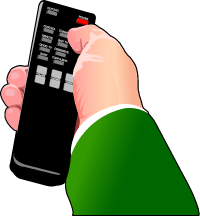The Rules of the Remote Control
Created | Updated Oct 26, 2005

In modern households, the television set (TV, or 'telly') is becoming more and more the focal point of in-home entertainment, even if it's for playing video games as often as watching TV broadcasts. Most living rooms are arranged to optimise TV viewing, larger cabinets are purchased to accommodate larger TV's, and it appears almost every household these days is a multi-TV household (these are purely based on personal observations and have no basis in statistical evidence).
A critical component of the modern day TV sets are the remote controls. TVs are rarely switched on at the unit and most people would rather watch an hour of the Augustine monks chanting Britney Spears's greatest hits than actually get up and change the channel at the unit. The remote control has become the symbol of power, the royal crown of the living room if you will (only the remote control actually does something). An object of such power must be restrained in some way. A power this great cannot go unchecked. Too many feuds have already been fought, too many hissy fits thrown, dummies spat and doors slammed in the name of the remote control. This document is an attempt to put some boundaries on and definite rules about the use of the remote control. Maybe now peace can return to living rooms everywhere.
(The following rules for the remote control are appropriate for family households and share households alike.)
- The person who originally bought the TV or who pays for the cable TV has ultimate control of the remote and ultimate right of veto (however they are still bound by the duties of the remote controller [duties of the controller outlined in rule 4]).
- If the person mentioned in rule 1 is not watching the TV then the person who switches the TV on is in control of the remote.
- The person in control of the remote (including the person mentioned in rule 1) must relinquish control if they:
- get up and leave the general vicinity of TV (unless they are getting something for another viewer, then this viewer is then morally responsible to protect and carry on the duties of the controller till their return)
- are paying no attention to the TV or the remote control
- are voted off the remote by a majority of viewers in the room (the owner of the TV unit has two votes, the person in question has none)
- are found to be not adequately carrying out the duties of the controller
- The duties of the controller are as follows:
- always be aware of what is currently on the TV and censor viewing according to the sensibilities and ages of the other viewers;
- in every advertisement break, a quick sweep of all other channels must be carried out to check for a better show, returning to the previously selected channel no more than seven seconds before the end of the commercials;
- adjust the volume of the TV for all viewers in the room.
- adjust the tuning, picture quality and sound quality of the TV for all viewers in the room;
- adjust volume of TV (or even mute in extreme cases) if it is necessary for another household member to answer an important phone call in the same room (however this type of behaviour should not be tolerated for longer than 1 minute during a show or 5 minutes during an advertisement break);
- in the case of multiple remote controls the responsibilities of the controller increase exponentially with the addition of each individual unit (eg DVD, video, stereo, lighting, air conditioning, etc);
- A member of the household has a right to the remote if they have previously reserved the TV for that time by letting each and every member of the household know of their intention to watch a certain program at that time. Hiding the remote is not an acceptable form of TV reservation (this reservation can only be vetoed if the reserver has a TV in their bedroom);
- If a remote control is lost, it is the responsibility of the entire household to search for it (see Rules to Help you Find your Remote Control) with the transfer of controller power going to the finder of the remote control.
- If a dispute over the control of the remote control arises regardless of the adhesion to of the above mentioned rules a simple game of 'Paper, Rock, Scissors' (best out of three games) should be completed to decide who will be the controller for that viewing.
- If the dispute cannot be resolved after 'Paper, Rock, Scissors' these members of the household do not deserve to behold such a sacred and honoured object as a TV and should be banished from the living room till after dinner.
May your future television viewings be peaceful, educational and entertaining.

